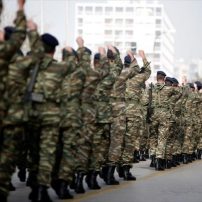
Failure of the authorities to protect the lives of two soldiers who were killed by a fellow conscript with a heavy criminal record. Violation of the right to life
JUDGMENT
Hovhannisyan and Karapetyan v. Armenia 17.10.2023 (app. no. 67351/13)
SUMMARY
The applicants are the parents of two soldiers who were killed during their compulsory military service by a fellow conscript, KA, in a shooting incident. KA, who had an “extensive” criminal record, shot and killed six (6) soldiers, including the applicants’ sons and the platoon commander, and then killed himself. The applicants complained that the state had failed to protect their children’s right to life and to conduct an effective investigation into the incident.
According to the ECtHR, the authorities failed to establish rules and procedures and to adopt practical measures to effectively protect the applicants’ children’s right to life. The military authorities had recruited K.A. in the military with full knowledge of his previous convictions. However, they did not consider the nature and degree of dangerousness of the offenses he had committed in the US. The authorities therefore failed to take measures to maintain proper military discipline during the mandatory service of the applicants’ sons and to prevent the outbreak of violence believed to be the cause of the tragic shooting.
The ECtHR found a violation of the substantive part of Article 2.
It then ruled that the official investigation, although direct, independent and with the participation of the applicants to a degree sufficient to protect their interests, was not sufficiently thorough and did not take into account all the witness statements. He had serious shortcomings, including his alleged alcohol consumption.
The ECtHR also found a violation of the procedural part of Article 2.
The Court also unanimously found a violation of Article 13 due to the legal failure at the critical time to bring an Action for compensation for mental anguish suffered by the applicants as a result of the loss of their children’s lives. It awarded each of the applicants €30,000 for mental anguish.
PROVISIONS
Article 2
Article 13
THE DECISION OF THE COURT…
Article 2:
(a) Substantive limb – In view of the standards adopted in its case-law and the fact that the applicants had not fundamentally challenged the conclusion of the domestic investigation into the incident that K.A. had been the one to open fire, the Court had no cogent reason not to make its assessment based on the facts as established by that investigation, despite serious deficiencies therein (see below). However, it concluded that the authorities had failed to put in place rules and procedures and to adopt practical measures to effectively protect the applicants’ sons’ right to life. The military authorities had drafted K.A. into the army with full knowledge of his previous convictions which had eventually resulted in his deportation from the US, a country where he had been living since his childhood, only a few months before his conscription. Nonetheless, at no point had they attempted to investigate K.A.’s character in more detail or to consider the nature and the degree of dangerousness of the offences he had committed in the US. Private K.A. had been characterised as requiring “enhanced supervision”, but the authorities had not explained what that had meant in practice in terms of supervision and what measures that had involved, besides routine conversations which had apparently been inefficient. According to the official investigation, the shooting had been triggered by the violent behaviour of the platoon commander towards K.A and the conscripts under his command. Although other officers had witnessed such behaviour on the day of the incident, they had failed to take steps to prevent the possible violence of which there were obvious signs, or to report the situation to the superiors. Lastly, contrary to military rules, neither the second applicant’s son nor K.A. had been requested to hand in their weapons after their shift, and all the servicemen who had died, including the platoon commander, had been found to have consumed alcohol at some point. The authorities had thus failed to adopt any measures to maintain proper military discipline during their mandatory service and prevent the occurrence of the violence believed to have been the reason for the tragic shooting.
In conclusion, the authorities had failed in their positive obligation to protect the applicants’ sons’ lives during their military service.
Conclusion: violation (unanimously).
(b) Procedural limb – The official investigation, albeit prompt, independent and involving the applicants to a degree sufficient to protect their interests, had not been sufficiently thorough. It had serious shortcomings which had resulted in a failure to shed full light on the circumstances surrounding the fatal shooting, including, among other things, the alleged consumption of alcohol by private K.A. and other servicemen, the reasons for which he had also killed his fellow servicemen and the origin of non-gunshot injuries found on the body of one of the conscripts shot by K.A. The investigation had also failed to address the account of one of the main witnesses of the events preceding the shooting – which did not completely correspond to the facts established in the investigation – and to clarify the role played by high-ranking officers from other units on which disciplinary liability had been imposed with regard to the incident.
Conclusion: violation (unanimously).
The Court also found, unanimously, a violation of Article 13 on account of the legal impossibility at the material time of applying for compensation for non-pecuniary damage suffered as a result of the loss of life of one’s child.
Article 41: EUR 30,000 to each of the applicants in respect of non-pecuniary damage.


